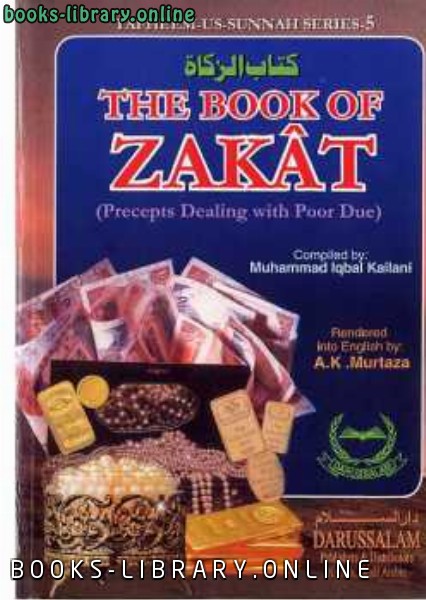📘 قراءة كتاب The Book of Zakat أونلاين

عفواً..
هذا الكتاب
غير متاح للتحميل، حفاظًا على حقوق دار النشر. ،، يمكنكم شراؤه من مصادر أخرى

f the five fundamentals of Islam, Zakat occupies the second positioin, the first being prayer (salat). This word is derived from Zakd, which means it (a plant) grew. The second derivative of this word carries the sense of purificatin, e. g. Qad aflaha man zakkaha (he is indeed successful who purified himself). The other word used for zakat both in the Qur'an and the Hadith is sadaqa which is derived from sidq (the truth). Both these words are highly meaningful. The spending of wealth for the sake of Allah purifies the heart of man of the love of material wealth. The man who spends it offers that as a humble gift before the Lord and thus affirms the truth that nothing is dearer to him in life than the love of Allah and that he is full prepared to sacrifice everything for His sake. Secondly, zakat is the most effective measure to improve the economic condition of the have-nots. It is not, however, a mere tax, but a form of worship whereby a man comes close to his Lord. The Muslims have, therefore, been enjoined to pay zakat with the same sense of earnestness and devotion in which the seeker of the Lord observes the prayer. The primary motive of zakat is religious and spiritual, while the social and economic aspects are subservient to it. Its social significance is that it awakens in man the sense of brotherhood with less fortunate members of society, and stirs his moral conscience to make sacrifice for their sake. From the economic point of view it discourages hoarding and concentration of wealth and helps its steady and constant flow from the rich to the poor. It is in fact a good means of providing purchasing power to the poor, for ameliorating their hard lot and enabling them to stand on their own legs.
It should also be remembered that zakat or sadaqa in Islam is not a voluntary act of charity which a rich man gives to the poor out of his own sweet will, but it is an obligatory act which every Muslim is enjoined upon to perform if he is sincere in his belief in God and the Hereafter. Thus there is no burden of obligation on one who receives zakat, but a sense of thankfulness and gratitude on the part of the giver, since he has been enabled by the recipient to discharge his obligation that he owes to God and society.
(O Prophet), take sadaqa (zakat) out of their property-thou wouldst cleanse them and purify them thereby (Qur'an, ix. 103). And away from it (the Hell) shall be kept the most faithful to duty who gives his wealth, purifying himself (xcii. 17-18).
So much is the importance of zakat in Islam that it has been mentioned at eightytwo places in the Qur'an in close connection with prayer. The Companions of the Holy Prophet (may peace be upon him) knew its basic importance in Islam. It is a known fact that after the death of the Apostle of Allah (may peace he upon him) when some of the tribes, who believed in the oneness of God and observed prayer, refused to pay zakat, the first Caliph Abu Bakr Siddiq (Allah be pleased with him), in an answer to the advice of Hadrat 'Umar (Allah be pleased with him) to show tolerance towards such people. said in explicit terms, By Allah, I would definitely wage war against them who dissociate prayer from Zakat. Zakat is paid on the surplus of wealth which is left over after the passage of a year. It is thus a payment on the accumulated wealth. Leaving aside animals and agricultural yield, zakat is paid at almost a uniform rate of two and a half %. The minimum standard of surplus wealth over which zakat is charged is known as Nisab. It differs with different kinds of property, the most important being 200 dirhams or 521 tolas (nearly 21 oz.) In case of silver, and 20 mithqals or 71 tolas (nearly 3 oz.) in case of gold. The nisab of cash is the same as that of gold and silver.
As regards the persons to whom zakat is to be paid, they have been clearly described in the Holy Qur'an: Alms are only for the poor, the needy, the officials charged with the duty of collection, those whose hearts are inclined to truth, the ransoming of captives, those in debt, in the way of Allah, and the wayfarer (ix 60)
This book is to collect all Islamic text that talk about Zakat. The author classifies and divided the book into chapters.
سنة النشر : 1997م / 1418هـ .
حجم الكتاب عند التحميل : 3.2 ميجا بايت .
نوع الكتاب : pdf.
عداد القراءة:
اذا اعجبك الكتاب فضلاً اضغط على أعجبني و يمكنك تحميله من هنا:
عفواً..
هذا الكتاب
غير متاح للتحميل، حفاظًا على حقوق دار النشر. ،، يمكنكم شراؤه من مصادر أخرى
🛒 شراء " The Book of Zakat " من متاجر إلكترونيّة
شكرًا لمساهمتكم
شكراً لمساهمتكم معنا في الإرتقاء بمستوى المكتبة ، يمكنكم االتبليغ عن اخطاء او سوء اختيار للكتب وتصنيفها ومحتواها ، أو كتاب يُمنع نشره ، او محمي بحقوق طبع ونشر ، فضلاً قم بالتبليغ عن الكتاب المُخالف:
 قبل تحميل الكتاب ..
قبل تحميل الكتاب ..
يجب ان يتوفر لديكم برنامج تشغيل وقراءة ملفات pdf
يمكن تحميلة من هنا 'http://get.adobe.com/reader/'


 منصّة المكتبة
منصّة المكتبة 